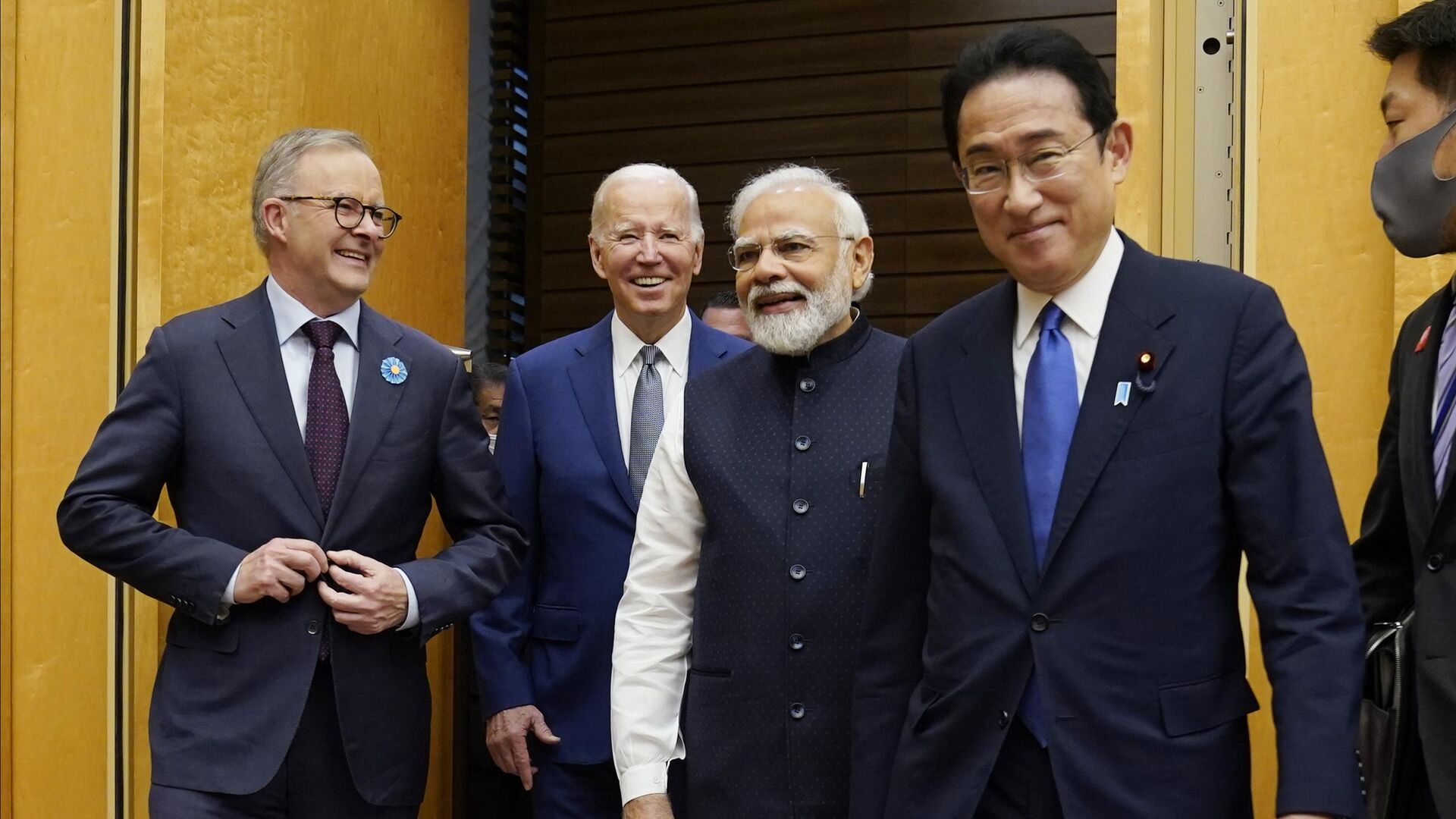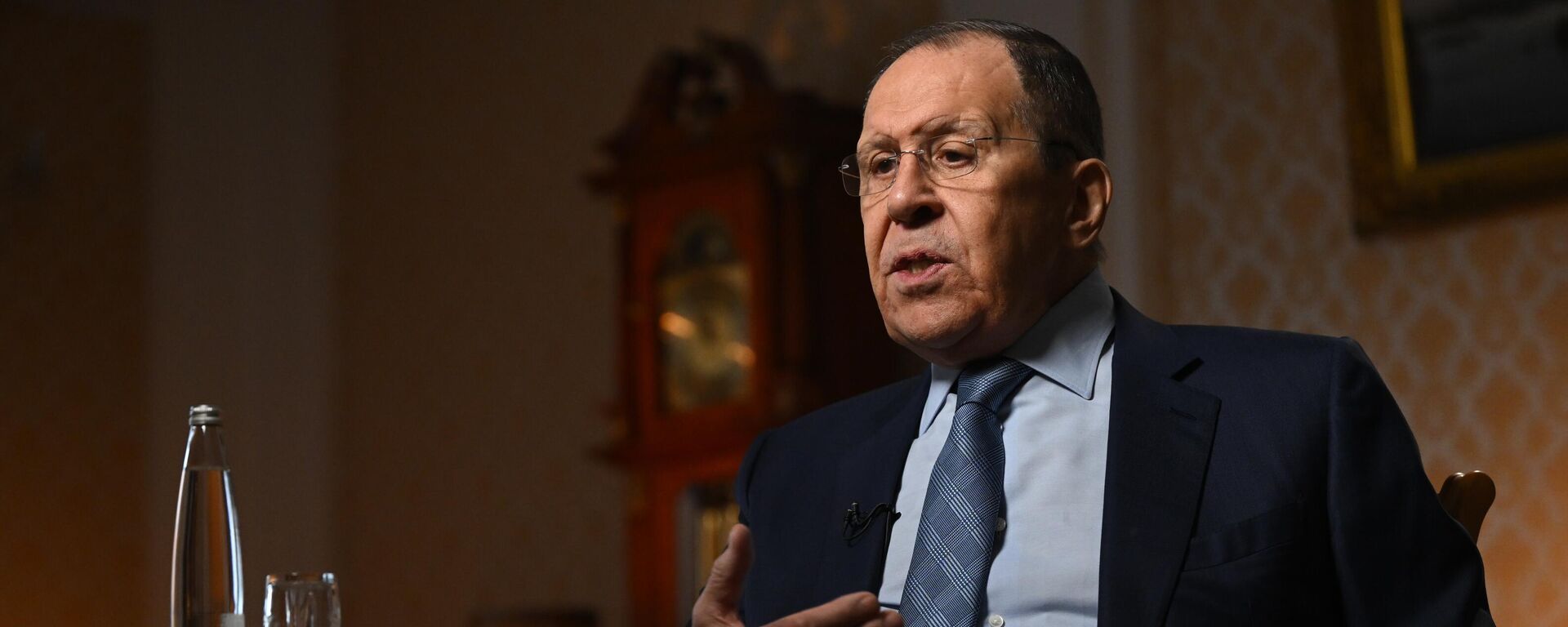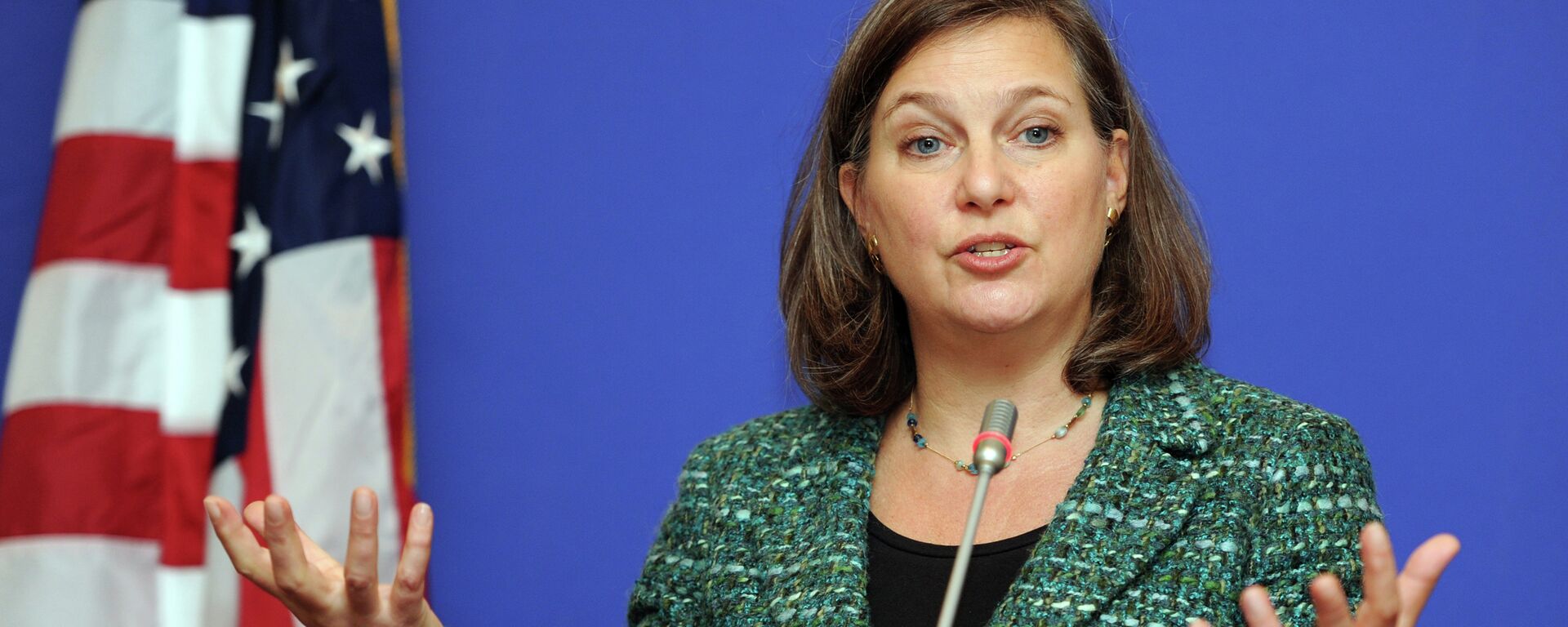https://sputniknews.in/20230208/proactive-neutrality-how-india-maneuvers-on-intl-arena-bypasses-us-pressure--793662.html
Proactive Neutrality: How India Maneuvers on Int'l Arena, Bypasses US Pressure
Proactive Neutrality: How India Maneuvers on Int'l Arena, Bypasses US Pressure
Sputnik India
Recent visits by US politicians to India have stirred talks of Washington trying to pull New Delhi away from Russia out of fear of ties growing warmer between... 08.02.2023, Sputnik India
2023-02-08T18:39+0530
2023-02-08T18:39+0530
2023-02-08T18:45+0530
india
military build-up
long reads
russia
us
global south
ukraine
multilateralism
indo-pacific
brahmos supersonic cruise missile
https://cdn1.img.sputniknews.in/img/07e7/02/08/802821_0:0:2934:1651_1920x0_80_0_0_a2b8673bc69df16150c87fb08a52bf12.jpg
Due to India’s beliefs and its neutral foreign policy, the world's fifth largest economy has not taken sides, maintaining a diplomatic stance on the Ukraine conflict: this is despite facing massive pressure from the United States and constant attempts by its overseas partners to disrupt trade and military projects between New Delhi and Moscow.Talking to Sputnik, Dr. Swasti Rao, associate fellow at the Europe and Eurasia Center at the Manohar Parrikar Institute for Defense Studies and Analyses in New Delhi, said that for India, neutrality comes from a core commitment to reject an alliance-based view of the world, and maintain a multi-vector foreign policy.She explained that because New Delhi is wary of a China-dominated Asian order, India engages Russia to balance China. "This Indian concern was recently underscored indirectly by the Russian ambassador who said that normalizing China-India ties will be a core objective for Moscow.”Stating that India also engages Russia for its larger Eurasian aspirations and continental concerns, Dr. Rao said that whether engaging the Central Asians, or developing a trade corridor (INSTC) with Iran, which China and Pakistan are not parties to, or for retaining relevance in a Taliban-led Afghanistan, India needs support from Russia.India's Strategy on Military Cooperation with RussiaIndia, the biggest buyer of Russian arms, is now focusing on indigenously developed weapons and defense equipment, and looking to Eastern European nations for military gear and ammunition.According to Major General (Retd.) Harsha Kakar, a strategic analyst and founding member of the think tank STRIVE, India remains multi-aligned, adopting a strategic autonomy policy and no matter what pressure comes on it, the country will not reduce its military cooperation with Russia.Dr. Rao, on the other hand, believes that while it is unlikely Prime Minister Narendra Modi would agree to pursue military decoupling from Russia for defense supplies, "India aims for diversification for the import of military gear and ammunition and reducing dependence on arms exports."She explained that while the current defense procurement with Russia is steady, there could be real-time shortages and a longstanding impact of the Western sanctions regime. "While Russia has assured India of timely deliveries, India is mindful of future challenges and considers diversification of imports to be in its national interest," Dr. Rao added.India Aims for Indigenously Developed Defense EquipmentNandan Unnikrishnan, a distinguished fellow at the Observer Research Foundation in Delhi, opines that although India has increased indigenously developed defense equipment under the "Atmanirbhar Bharat" ("Self-Reliant India") initiative, it will take decades to become self-reliant and see a reduction in India's outright purchases of complete weapons systems from all suppliers, including Russia.The aim to locally produce weapons will initially require joint projects with foreign players to share technology and build India’s capacity.However, Dr. Rao shared: “India has been pushing for joint production and some of the ventures with Russia have been very successful – whether it’s the Brahmos or the gun-production at Amethi, to name a few.”To push indigenous development of weapons and defense equipment, India introduced a series of reforms in the Defense Acquisition Procedure (DAP) in 2016 and 2020.She added that Russia is still one of the most favored partners giving India weapons at the most competitive prices and engaging in flexible joint production ventures.Dr. Rao believes that despite the Joe Biden administration’s verbal assurance of trying to replace Russia as the main weapons exporter, India would not want to replace one dependency with another.She said the most important factor is that American weapons are neither cheap nor has Washington been willing to set up joint ventures like Russia so far. "India would be careful in developing military ties with foreign countries because it is trying to look beyond the mercantilist ‘buyer-seller’ relationship and at joint ventures and possible TOTs as well."India Sees National Interest in Growing Economic Ties with RussiaAccording to Unnikrishnan, India has followed a policy of pursuing its national interests on the Russia-Ukraine conflict and sanctions.In recent years, India has expanded its energy trade with Russia, not letting the Ukraine conflict affect their close ties.“India will continue to resist pressures from other countries that do not serve its national interests or deflect it from its primary goal of economic development,” he stated. “At a time when the fossil fuel supplies are getting rerouted because of the sanctions, Russian sales of discounted crude to India have reached a record high. India’s energy security goals are not looking at transitioning to renewables in the same way as the developed economies are. For New Delhi, it will be about fuel mixes rather than making transitions,” Dr. Rao shared.Multi-Vector Foreign PolicyMaj. Gen. (Retd.) Kakar opined that there was a time when the world questioned India's independent autonomy and its independent choices.However, the US has understood that India has an independent foreign policy and that it is going to be strategically autonomous.“Despite the conflict and pressure, India-US relations are growing. The recent signing of the initiative on Critical and Emerging Technology (iCET) between India’s national security advisor-led (NSA) team and its US counterpart indicates the growing collaboration between the two states," he explained.Dr. Rao assumed that the US policy in South Asia has been dubious because of Washington engaging with Pakistan and, thereby "balancing" India in the region.“India does not get the same support from the US in the UNSC on the issue of Kashmir. That said, due to the multi-vector foreign policy and convergence on Indo-Pacific, India-US cooperation has been growing since 2016. An empowered India in the Indo-Pacific is in the best interest of the US for countering China,” she opined.Kakar shared that the world has accepted the fact that India's neutral stance is possibly the best stance, opting for a diplomatic settlement of the Ukraine conflict.
https://sputniknews.in/20230202/russian-fm-sergey-lavrov-speaks-to-sputnik-on-current-international-agenda-725514.html
https://sputniknews.in/20230131/us-trying-to-sell-own-weapons-under-guise-of-convincing-india-to-shun-russian-arms-699261.html
india
russia
us
global south
ukraine
indo-pacific
Sputnik India
feedback.hindi@sputniknews.com
+74956456601
MIA „Rossiya Segodnya“
2023
Sangeeta Yadav
https://cdn1.img.sputniknews.in/img/07e6/0c/0f/110602_0:0:641:640_100x100_80_0_0_c298016a79eb02ef8caa9d1f688c12a5.jpg
Sangeeta Yadav
https://cdn1.img.sputniknews.in/img/07e6/0c/0f/110602_0:0:641:640_100x100_80_0_0_c298016a79eb02ef8caa9d1f688c12a5.jpg
News
en_IN
Sputnik India
feedback.hindi@sputniknews.com
+74956456601
MIA „Rossiya Segodnya“
Sputnik India
feedback.hindi@sputniknews.com
+74956456601
MIA „Rossiya Segodnya“
Sangeeta Yadav
https://cdn1.img.sputniknews.in/img/07e6/0c/0f/110602_0:0:641:640_100x100_80_0_0_c298016a79eb02ef8caa9d1f688c12a5.jpg
russia-ukraine conflict, how indian policies help tackle west's pressure, india-russia military cooperation, west imposed various sanctions on russia following its military operation in ukraine, india aiming for indigenous-developed defence equipment, india's strategy on military cooperation with russia, india’s multi-vector foreign policy with the us,
russia-ukraine conflict, how indian policies help tackle west's pressure, india-russia military cooperation, west imposed various sanctions on russia following its military operation in ukraine, india aiming for indigenous-developed defence equipment, india's strategy on military cooperation with russia, india’s multi-vector foreign policy with the us,
Proactive Neutrality: How India Maneuvers on Int'l Arena, Bypasses US Pressure
18:39 08.02.2023 (Updated: 18:45 08.02.2023) Recent visits by US politicians to India have stirred talks of Washington trying to pull New Delhi away from Russia out of fear of ties growing warmer between the two strategic partners.
Due to India’s beliefs and its neutral foreign policy, the world's fifth largest economy has not taken sides, maintaining a diplomatic stance on the Ukraine conflict: this is despite facing massive pressure from the United States and constant attempts by its overseas partners to disrupt trade and military projects between New Delhi and Moscow.
Talking to Sputnik, Dr. Swasti Rao, associate fellow at the Europe and Eurasia Center at the Manohar Parrikar Institute for Defense Studies and Analyses in New Delhi, said that for India, neutrality comes from a core commitment to reject an alliance-based view of the world, and maintain a multi-vector foreign policy.
“India’s neutrality on Ukraine has been directly linked with its arms dependence on Russia and the support from Moscow on India’s stand on Kashmir at the United Nations Security Council (UNSC),” Dr. Rao said.
She explained that because New Delhi is wary of a China-dominated Asian order, India engages Russia to balance China. "This Indian concern was recently underscored indirectly by the Russian ambassador who said that normalizing China-India ties will be a core objective for Moscow.”
Stating that India also engages Russia for its larger Eurasian aspirations and continental concerns, Dr. Rao said that whether engaging the Central Asians, or developing a trade corridor (INSTC) with Iran, which China and Pakistan are not parties to, or for retaining relevance in a Taliban-led Afghanistan, India needs support from Russia.
"A weakened Russia is not in India’s interests and therefore India will not join alliances that will categorically weaken Russia in this part of the world,” she added.
India's Strategy on Military Cooperation with Russia
India, the biggest buyer of Russian arms, is now focusing on indigenously developed weapons and defense equipment, and looking to Eastern European nations for military gear and ammunition.
According to Major General (Retd.) Harsha Kakar, a strategic analyst and founding member of the think tank STRIVE, India remains multi-aligned, adopting a strategic autonomy policy and no matter what pressure comes on it, the country will not reduce its military cooperation with Russia.
“India has always looked to procuring its weapons supplies from different sources. Secondly, India-Russia dependency goes a long way. And a large part of the Indian equipment is still Russian outsourced. And equipment, once it enters service, remains in service for almost three to four decades, depending on where it is employed and for what purposes.”
Dr. Rao, on the other hand, believes that while it is unlikely Prime Minister Narendra Modi would agree to pursue military decoupling from Russia for defense supplies, "India aims for diversification for the import of military gear and ammunition and reducing dependence on arms exports."
She explained that while the current defense procurement with Russia is steady, there could be real-time shortages and a longstanding impact of the Western sanctions regime.
"While Russia has assured India of timely deliveries, India is mindful of future challenges and considers diversification of imports to be in its national interest," Dr. Rao added.
India Aims for Indigenously Developed Defense Equipment
Nandan Unnikrishnan, a distinguished fellow at the Observer Research Foundation in Delhi, opines that although India has increased indigenously developed defense equipment under the "Atmanirbhar Bharat" ("Self-Reliant India") initiative, it will take decades to become self-reliant and see a reduction in India's outright purchases of complete weapons systems from all suppliers, including Russia.
“India is currently following a policy of localizing production of defense equipment. The subsequent step is the indigenous development of weapons for their use as well as export," Unnikrishnan told Sputnik.
The aim to locally produce weapons will initially require joint projects with foreign players to share technology and build India’s capacity.
However, Dr. Rao shared: “India has been pushing for joint production and some of the ventures with Russia have been very successful – whether it’s the Brahmos or the gun-production at Amethi, to name a few.”
To push indigenous development of weapons and defense equipment, India introduced a series of reforms in the Defense Acquisition Procedure (DAP) in 2016 and 2020.
“No other foreign players have been so keen on meeting India’s DAP guidelines as Russia has. But defense industry partnerships with players like the US, France, and Israel have also been growing. The buck usually stops at the issue of Transfer of Technology (TOT). India is pushing for TOT, but foreign players are reluctant to share their technology,” Dr. Rao said.
She added that Russia is still one of the most favored partners giving India weapons at the most competitive prices and engaging in flexible joint production ventures.
Dr. Rao believes that despite the Joe Biden administration’s verbal assurance of trying to replace Russia as the main weapons exporter, India would not want to replace one dependency with another.
She said the most important factor is that American weapons are neither cheap nor has Washington been willing to set up joint ventures like Russia so far. "India would be careful in developing military ties with foreign countries because it is trying to look beyond the mercantilist ‘buyer-seller’ relationship and at joint ventures and possible TOTs as well."
India Sees National Interest in Growing Economic Ties with Russia
According to Unnikrishnan, India has followed a policy of pursuing its national interests on the Russia-Ukraine conflict and sanctions.
In recent years, India has expanded its energy trade with Russia, not letting the Ukraine conflict affect their close ties.
“India will continue to resist pressures from other countries that do not serve its national interests or deflect it from its primary goal of economic development,” he stated.
“India is an extremely price-sensitive country with hundreds of millions of people below or just above the poverty line. Cheaper than market crude oil definitely helps control inflation and the price line of other products,” Unnikrishnan added.
“At a time when the fossil fuel supplies are getting rerouted because of the sanctions, Russian sales of discounted crude to India have reached a record high. India’s energy security goals are not looking at transitioning to renewables in the same way as the developed economies are. For New Delhi, it will be about fuel mixes rather than making transitions,” Dr. Rao shared.
Multi-Vector Foreign Policy
Maj. Gen. (Retd.) Kakar opined that there was a time when the world questioned India's independent autonomy and its independent choices.
However, the US has understood that India has an independent foreign policy and that it is going to be strategically autonomous.
“Despite the conflict and pressure, India-US relations are growing. The recent signing of the initiative on Critical and Emerging Technology (iCET) between India’s national security advisor-led (NSA) team and its US counterpart indicates the growing collaboration between the two states," he explained.
"Therefore, US pressure on India to move away from Russia or to change its neutral stance has now reduced and that is possibly the way it's going to stay even in the future,” Kakar said.
Dr. Rao assumed that the US policy in South Asia has been dubious because of Washington engaging with Pakistan and, thereby
"balancing" India in the region.
“India does not get the same support from the US in the UNSC on the issue of Kashmir. That said, due to the multi-vector foreign policy and convergence on Indo-Pacific, India-US cooperation has been growing since 2016. An empowered India in the Indo-Pacific is in the best interest of the US for countering China,” she opined.
Kakar shared that the world has accepted the fact that India's neutral stance is possibly the best stance, opting for a diplomatic settlement of the Ukraine conflict.




